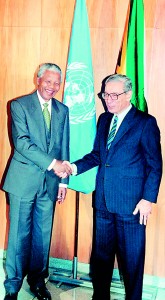Sunday Times 2
UN, fluent in Anglo-French, seeks to go multilingual
UNITED NATIONS, (IPS) – When Egypt’s onetime Foreign Minister Boutros Boutros-Ghali was running for the post of U.N. secretary-general in late 1991, he had to contend with the candidature of Bernard Chidzero, then foreign minister of Zimbabwe.
As the campaign began to intensify, Boutros-Ghali recounted a brief encounter with Chidzero, a longstanding friend, at a conference in Africa, a continent which at that time claimed the job of U.N. chief on the basis of geographical rotation.
Chidzero, who hailed from an English-speaking country and was backed by the UK and the 54-member Commonwealth of mostly ex-British colonies, was in conversation with Boutros-Ghali when he suddenly switched from English to French.
Having picked up the subtle message, Boutros-Ghali said he put his arms around Chidzero and jokingly remarked, “Bernard, if you want the approval of France, you must not only speak French, but also speak English with a French accent.”
France, a veto-wielding permanent member of the Security Council, has been so passionately protective of its language that it may well have exercised its veto on any candidate who did not speak French.

South African President Nelson Mandela (L) shakes hands with UN Secretary-General Boutros Boutros-Ghali 03 October 1994 before addressing the UN General Assembly in New York (AFP)
And no one who aspires to be the secretary-general of the United Nations can expect to be elected to office if he or she does not have a working knowledge of French – or at least promises to master the language – because France considers it the “language of international diplomacy”.
Over the last 66 years, the two working languages of the United Nations have been primarily English and French, although there are four other official languages recognised by the world body: Chinese, Arabic, Spanish and Russian.
Boutros-Ghali, who was fluent in English, Arabic and French, held “the world’s most impossible job” from January 1992 through December 1996.
Last week the 132-member Group of 77 developing countries complained “that the disparity among the use of the (six) official languages on the U.N. website has continued to deepen.”
Ambassador Peter Thomson of Fiji, the current G77 chair, told the Committee on Information that despite the efforts of the Department of Public Information (DPI) to improve the multilingual contents of the U.N. website, the shortcomings continue.
“The Group reiterates its request that content-providing offices in the U.N. Secretariat translate all English language materials and databases into all official languages and make them available on the respective language websites,” he implored.
Last month the DPI took the initiative to pilot the translation of press releases into Spanish during the meeting of the Commission on Population and Development.
Currently, the Department of Peacekeeping Operations is the only U.N. website in all six languages.
Asked for a response, U.N. spokesman Farhan Haq told IPS that as for press releases, the two regular units are the ones that put out press releases in English and in French, the two official working languages of the United Nations.
“However, we have radio services in many more languages, including the six official languages, and we translate the secretary-general’s messages into a large number of languages, including those six, once they are disseminated,” he said.
Haq said simultaneous interpretation is therefore not the only instance where the U.N. uses all six languages.
Another example is U.N. documents, including resolutions, the secretary-general’s reports, exchanges of letters and so forth, which are translated into all six languages, he added.
Asked about the language skills of the current secretary-general, Haq said Ban Ki-moon speaks three of the six languages (English, French and Chinese), along with Korean.
“When he travels, he also tries to use his grasp of other languages,” Haq said. “That also answers your other question, since Boutros Boutros-Ghali was not the only secretary-general fluent in three languages: Javier Perez de Cuellar (of Peru) was fluent in English, French and Spanish.”
Asked for her response, Ambassador Lyutha Sultan Al-Mughairy of Oman, chair of the Committee on Information, told IPS her committee, for the first time, underlined the responsibility of the Secretariat in mainstreaming multilingualism in all its communication and information activities, “within existing resources on an equitable basis”.
“It is thus a reference that is not limited to DPI. That said, the new under secretary-General for DPI, Peter Launsky-Tieffenthal, has offered innovative ideas in this regard,” she added.
A pilot project was launched in issuing press releases in Spanish for meetings of a major commission last month.
And the website of the United Nations Multidimensional Integrated Stabilization Mission in Mali is in all six languages, she pointed out.
With the support of U.N. Volunteers, the introductions to chapters of the most recent Yearbook of the United Nations have been translated into all official languages.
“So I believe there is much that is creatively possible and I believe we have a leadership in DPI which wishes to do its best,” said Ambassador Al-Mughairy.
Follow @timesonlinelk
comments powered by Disqus

